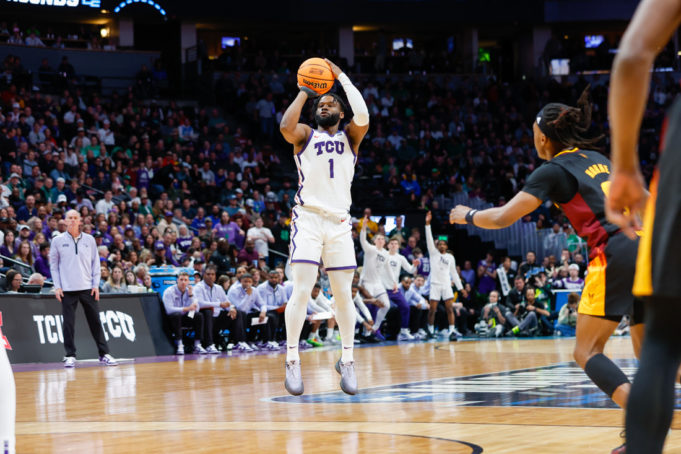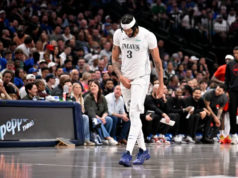Higher standards hurt. There was a time, not long ago, when TCU men’s basketball achieving a sixth-seed selection and advancing to the round of 32 was unfathomable. Now, under Coach Jamie Dixon, TCU has danced into Round Two in consecutive years. Sadly, the Sweet 16 seems a bitter glass backboard the Frogs can’t quite break.
This year more than ever, following Frog sports in general is increasingly a young person’s game. The quantity of adrenaline residue from football season still persists in trace amounts. Last Friday night filled glands to the brim when TCU faced 11th-seed Arizona State, who manhandled the Nevada Wolfpack during their play-in game the previous Wednesday. Dixon’s dribblers tipped and scored early, building a satisfying lead in the opening minutes before the Sun Devils seemingly switched on easy-mode and every shot from the floor just fell effortlessly.
ASU, defensively, was committed to overwhelming the paint and invited perimeter shots while the Frogs struggled mightily. In response, Mike Miles drove straight into contested territory, drawing foul after foul and delivering the Devils into early bonus trouble. The purple people took advantage by scoring consistently from the stripe and keeping pace with the red-hot demons despite repeated deficiencies from the field. State, despite their early 11-point deficit, flipped the game and carried a seven-point lead to halftime. Even more worrisome, Miles exploded for a posterizing fast-break dunk late in the half but landed awkwardly and seemed to hyperextend his knee before limping from the floor and collapsing in the tunnel walkway. He hobbled himself to the locker room with the team, but after he fell to the ground, I professed out loud, “This game is over.”
Basketball, as a sport, tends to be streaky. The Sun Devils must have exhausted their automatic shooting too early and stalled long enough for TCU to crawl themselves back into contention, mostly thanks to Miles returning to the floor — seemingly 100% healthy — and to proficiency from the foul line. It took almost the entire second half for the Frogs to overcome their mid-game slump, and a straight-ahead three by purple guard Damion Baugh knotted the score at 67 with less than two minutes remaining. Dixon’s teams have not won many games when they’ve failed to eclipse 75 points this season. They also arrived in Denver as the most proficient fast-break roster in the nation, but there were few to speak of on Friday. TCU proved stubborn, if nothing else, as they prevented the Devils from scoring while they inched ahead via free throws. ASU bullseyed a late triple to knot the game with 13 seconds left.
Coming out of the timeout, Miles attacked the paint only to meet a double team before dishing the ball to forward Jakobe Coles on the perimeter, who drove and floated a field goal with only enough time remaining for a full-court prayer that sailed over the Frogs’ backboard. The Sun Devils had given the Frogs a tough test, but Dixon had exorcized the sixth-seed demons — or Devils in this case — from the Syracuse game during his first tournament berth as his alma mater’s coach.
Third-seed Gonzaga proved a tougher out, a more experienced test, to say the least. The Bulldogs had won this round of their tournament bracket for seven consecutive seasons, and their forward Drew Timme, a Richardson native, was going to be the focal man per usual. Despite a questionable mustache, Timme (pronounced like the wheelchair-bound kid on South Park) handsomely damaged the Frogs in the paint, which was made more disappointing considering Eddie Lampkin’s recent separation — he was previously the roster member with the size and skill set meant to counter such an opponent.
Despite lacking a true middle man, TCU used their speed and athleticism to build an early lead that grew to as many as seven points. Sadly, Gonzaga proved to be elimination by a thousand cuts or, more specifically, fouls. The Frogs out-fouled the Zags 24-17, primarily occurring in the first half against Timme working through the lane.
Optically, Arizona State seemed like a more athletic and imposing team than Gonzaga. Baugh regularly rebounded or received inbound passes and sprinted the floor while the Bulldogs flowed slowly back to their positions. The Zags also seemed satisfied with spreading four to the perimeter on defense and allowing Timme to patrol the paint alone, allowing repeated pass and layup opportunities. Retrospectively, Gonzaga was never flustered, which became evident when they patiently stacked their shooting opportunities and buckets started falling during the second frame.
Four minutes into the latter half, the Zags had erased TCU’s lead, and a back-and-forth affair ensued in which scoring by either team was seldom. An extended Frog slump left Dixon and company trailing by seven with barely a minute remaining. Despite a brief reprieve of hope from a Koles three[-]pointer, TCU couldn’t conjure clutch buckets to erase the hole. Gonzaga, thanks to timely free-throw shooting near the end, left the clock to expire with a comfortable six-point lead, leading to an uncontested roll, grab, and swish by Baugh which covered the spread for TCU and left a slightly more palatable 81-84 final score.
Despite another round-of-32 elimination, both games were exceptionally exciting, and TCU acquitted themselves as a competitive squad against what has become a college-basketball namesake. The Frogs did not leap as close to the Sweet 16 as their overtime loss against first-seed Arizona, but carrying a lead the majority of the game or within a possession until the last several minutes is not a disaster. Still, it wasn’t a win, and it is still therefore a massive disappointment from what might be the best hardwood roster Fort Worth has seen in the modern era.
Admittedly, other than foul shooting and taking care of the ball, TCU didn’t play well on Friday against Arizona State, and their offense found swagger only in the first and last five minutes of the game. Despite the foul trouble, and falling prey to Gonzaga’s perimeter-trap defense, Dixon’s game plan was sound, and the players balled near their highest level against an opponent who was just better and more comfortable with the circumstances. Neither team shot fouls well on Sunday, but the Zags made them near the buzzer when they counted most.
The Frogs weren’t the only Big 12 squad that stumbled short of projections or, in some cases, minimum expectations. Iowa State — whom the Frogs never beat this season — fell completely flat in their opening game against Dixon’s former team, Pitt, losing by 18. West Virginia dropped their opener by two versus Maryland. Kansas — who was the top-seed in TCU’s region and the defending national champions — lost to eighth-seed Arkansas by one point on Saturday. Baylor washed out in the second round also, losing by nine to the sixth-seed Creighton Blue Jays earlier in the day on Sunday.
Of the seven conference teams that started dancing, only Kansas State and Texas remain. The Wildcats will fight the Michigan State Spartans during the opening game on Thursday, and the Longhorns tip with third-seed Xavier during the late and last game on Friday. In step with the Big 12, the state of Texas — which started out with seven selected teams in the tourney — is down to only two representatives, as well as one-seed Houston, who plays in the second of four matchups against fifth-seed Miami on Friday.
Inevitably, it’s a gripe and deficiency that I’ve maligned TCU basketball for in past years and has been a consistent roster problem since the departure of Vladimir Brodzionsky: The Frogs don’t roster a versatile big man. Timme was the star of this contest, as he’s been of his team and conference for several years. The last time TCU had a shot at the Sweet 16, center Christian Koloko from Arizona double-doubled with 12 rebounds and 28 points. Timme was close to that with eight rebounds and 28 points but didn’t have the luxury of an overtime period to pad his stats, or he surely would have eclipsed 30. The hypothetical question of Lampkin’s presence will be forever an unanswered “what if?” for this year’s Frogs and Dixon, especially since Miles is likely heading to the league, leaving hardwood fanatics wondering who their flashpoint to ignite the offense will be.
Lampkin and Timme are different players, but he was the Frog who would have had the best chance to slow him down. Until Dixon can lock down a prospect or transfer who can neutralize, significantly impede, or match what a talented big man can do, the Frogs will continue to play seasons with flavor but will fall short of being sweet.











